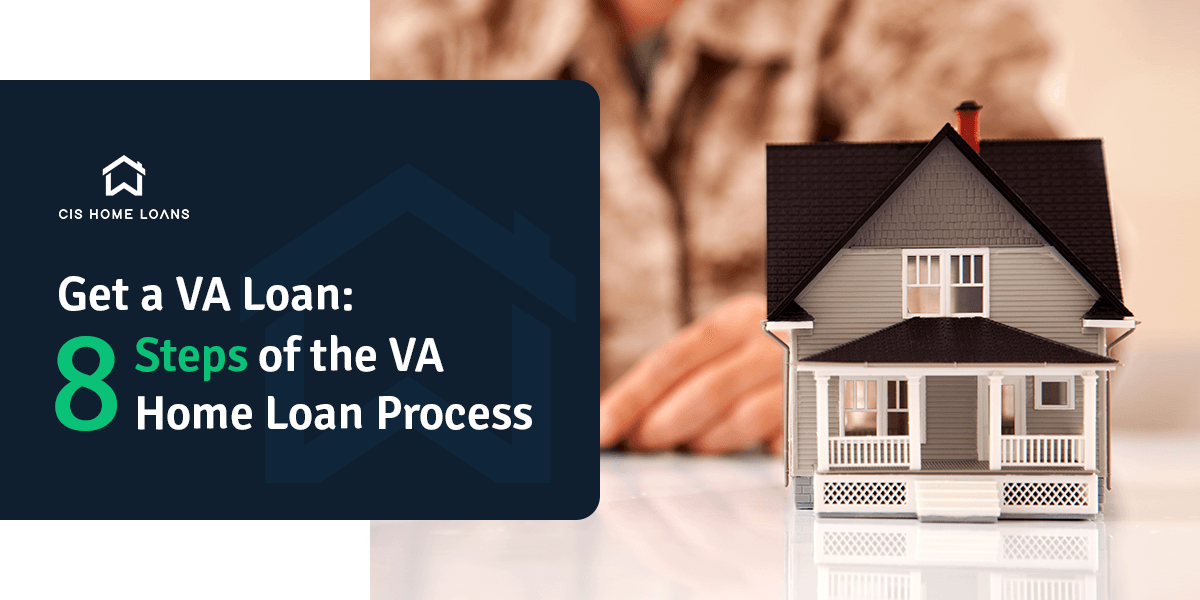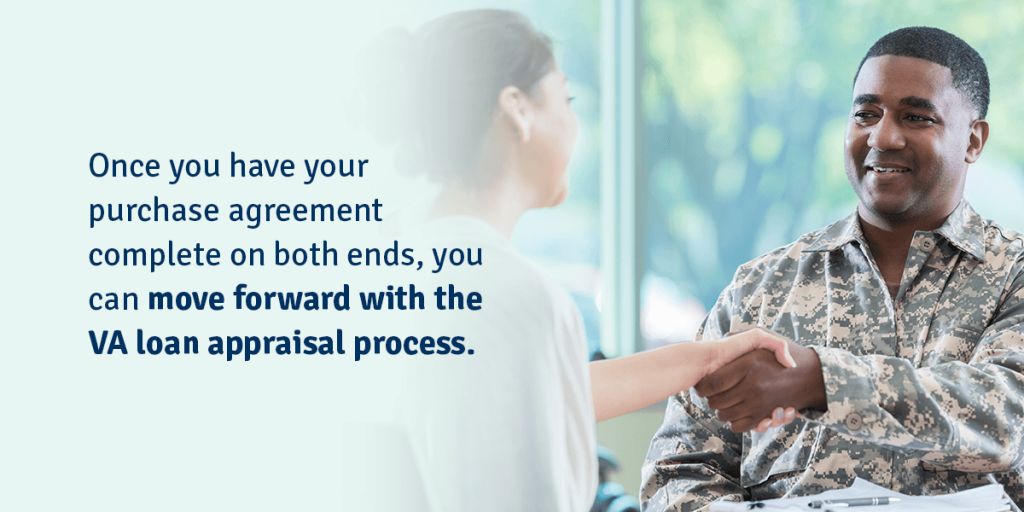
The U.S. Department of Veterans Affairs offers financial assistance and benefits to active-duty military, Reserve members and retired military veterans, including affordable home loans. There are many steps to the VA house loan process, and it can typically take a couple of months from receiving an official Certificate of Eligibility to sitting at the closing table. Follow these first-time homebuyer VA home loan tips to learn more about achieving the dream of homeownership via a VA loan.
VA Loan – Home Buying Steps
1. Ensure You Meet the VA Loan Requirements for Buyers
Start your VA mortgage loan process by familiarizing yourself with VA loan requirements for buyers and ensuring you meet them. To qualify for a VA home loan, applicants must be active-duty, Reserve or retired military members. There are length-of-service requirements for veterans and service members on active duty and National Guard and Reserve members. You will have to meet these to qualify for a VA loan.
If you don’t meet the length-of-service requirements, some unique circumstances may exempt you. These include discharges for:
- Hardship
- Government convenience
- Early out
- Reduction of force
- Specific medical conditions
- A disability from military service
You may also be eligible for a VA loan if you served as a member in specific organizations aligned with the U.S. military or are a U.S. citizen who served for another government that operated as an ally of the United States in World War II. Other notable cases that may qualify for a VA loan include spouses of MIA or POW veterans or veterans who have passed away.
Credit score may be another determining factor of VA loan eligibility. The VA does not have a minimum credit score requirement. Instead, the VA requires lenders to assess the borrower’s entire loan profile.
Once you have determined that you meet the VA loan eligibility and credit requirements, you can apply for a Certificate of Eligibility.
2. Apply for Your VA-Backed Home Loan Certificate of Eligibility
Next in the VA loan process timeline, apply for your VA home loan Certificate of Eligibility. For this first part of the VA loan approval process, you will need documents corresponding with your relationship with duty.
- Veterans and current or past activated National Guard or Reserve members: You will need DD Form 214, a copy of your discharge papers or separation documents.
- Currently active service member or inactive member of the Reserves or National Guard: You will need a statement of service signed by your commander, adjutant or personal officer that shows your full name, date of birth, Social Security number, date of entry into service, duration of any lost time and the name of the command providing the information.
- Never activated discharged member of the National Guard: You will need NGB Form 22, your Report of Separation and Record of Service, from each period of your National Guard service. You will also need NGB Form 23, your Retirement Points Statement.
- Never activated discharged member of Reserves: You will need evidence of honorable service and a copy of your latest annual retirement points.
Once you have collected all the necessary documentation, you can fill out this request for a Certificate of Eligibility form. Mail it to the Department of Veterans Affairs for approval or apply online. Alternatively, you can have your loan officer request your Certificate of Eligibility digitally. It can take up to six weeks for your Certificate of Eligibility to process.
3. Choose a Lender for Your VA Home Loan
When choosing a lender, you’ll want to answer many questions before choosing one to commit to.
- Is the lender VA-approved? You want to start by ensuring the lenders you are comparing are VA-approved, meaning they have permission from the VA to fund loans in conjunction with the U.S. Department of Veterans Affairs.
- Does the lender have experience in the VA industry? Look for evidence of expertise such as testimonials and proof that the lender has worked with VA loans for a significant time and has gained appropriate knowledge. The goal here is to identify a reliable lender before you trust them with your investment.
- What can this lender offer you? Next, you will want to look at what perks the lender is offering you. These may include low APR, low interest rates, excellent customer service, the extent of financial coverage and a smooth experience from start to finish.
- Does the lender meet your financial needs? Select a lender that is capable of meeting all of your needs. Set a budget for yourself based on your monthly and disposable income after all other costs so you have a clear idea of what you can afford. Keep this budget in mind as you look for a lender that will meet you where you are. If you have a low credit score, find a lender that is willing to work with you. View CIS Home Loans for competitive rates and 100% financing options for your VA home loan.
Choose a lender that wants to play a role in helping you find the dream home you deserve. Once you are confident in your choice, you can move to the next step of the loan approval process and get preapproved for a VA loan.
4. Get Preapproved for a VA Loan
The VA loan preapproval step is crucial in this process because it tells sellers you are ready and willing to make an offer to close on their home.
Prequalify for a VA home loan by submitting the documents required by your lender. Documents that are useful for this step include:
- Social Security number
- Recent bank statements
- Life insurance policy
- Current pay stubs
- Tax returns
- Investment account statements from the past two months
- Details on the vehicles you own and their liquidation value
- Credit card accounts
- Auto loan accounts
- Personal loan accounts
If you already own real estate, you may also need to provide:
- Mortgage accounts
- Home equity account
- Home insurance policy
How Long Does a VA Loan Take to Process?
Once your lender approves your application, they will write you a letter of loan preapproval. These letters often come with a list of conditions and do not guarantee financing through the lender’s institution. Still, they show real estate agents and home sellers that you hold validated buying power. You can expect the VA loan preapproval to take up to a week, but the process is usually quicker than that, and you will have your approval within a few days.
At CIS Home Loans, we make VA loan preapproval easy with our online application. We offer a transparent loan approval process by providing live updates through our CIS Loan Portal. How long does the VA home loan process take? The whole process typically takes less than a month, from preapproval to the closing table. Once you have prequalification for your VA loan, you can start the next step in the VA home loan process — house hunting!
5. Find a Home
Now that you have the VA loan preapproval papers in your possession, it’s time for the exciting part — finding the perfect home for you. With the VA loan preapproval, buyers and real estate agents will see the legitimacy behind your offer. That will give you an advantage over others looking to purchase the same home. Before starting your house hunt, make sure you are familiar with your VA loan’s capabilities. Read these first-time home buyer VA loan tips before you get started.
- Due to VA loan occupancy requirements, the property you purchase with your loan must be one you intend to live in.
- If your desired property is not on the list of VA-approved properties, you can request that the VA Home Loan Center submit the property for approval review.
- It may be your first time purchasing a home with your VA loan, but once you qualify for a VA loan, you are eligible for life, which means you can use these benefits again.
- Be aware of all of the perks of your VA home loan when looking at homes, including zero money down, low interest rates, special closing costs and seller concessions, up to 100% financing and more.
VA Loan Homebuying Steps
Now that you have a better idea of what you can do with your home loan, it is time to search for a house! When house hunting, follow these steps to buying a house with a VA loan.
- Find a real estate agent: You will need an agent who is well-experienced with the VA house loan process and can find the best properties to fit the criteria.
- Sign agreements with your agent: Read all the contracts your real estate agent provides you before you sign. Be sure you are on the same page and aware of any additional required costs or obligations.
- Start your search: Ensure you are looking at homes that qualify for your loan. These include a single- or multi-family house with a unit you plan to live in. A townhouse or condo in a VA-approved community also meets the criteria. You can use VA home loans to build a new home, but this may fall into a gray area unless you purchase a home directly from the builder.
- View houses: Once you have found homes within the VA requirements, check them out and see which ones best fit your lifestyle. Continue to be mindful of your price range and only view homes within your budget.
- Narrow down your home choices: Make a list of your top two or three homes and create a pros and cons list to help you make the significant decision of which house to buy. Consider factors such as nearby school districts, work commutes, local amenities and weather.
- Buy your home: Now that you have narrowed down your top choices, it is time to make a final decision and make an offer on your home.
6. Make an Offer to the Seller
Once you have found the house you want to buy, make your offer to the seller. Start by touching base with your real estate agent and working with them to create your purchase agreement. They will look at home purchases comparable to yours to suggest a realistic price point for your offer. Ask your real estate agent for advice on adding any contingencies that would exempt you from responsibility in an unexpected situation. One example of this might be if a home inspection fails.
Additionally, be sure to include the VA escape clause, also known as the VA option clause, into your contract. This provision protects you as the buyer if you need to back out of the sale. It’s useful for homes with an appraisal value lower than the market asking price. This situation would force the buyer to pay the difference between the asking price and the loan out of pocket or take out more than they can afford. The clause allows the buyer to back out without any financial penalty. For a better understanding, view the written escape clause.
Once you have a complete purchase agreement, you can submit your offer to the seller. You may enter a negotiation period with the seller before you lock down a deal. Once you have your purchase agreement complete on both ends, you can move forward with the VA loan appraisal process.
7. VA Loan Appraisal
A home appraisal is a legal requirement in the VA home loan process. The VA has set minimum property requirements to ensure the house you are purchasing is safe and sound with no major internal or external concerns that could pose a threat to your well-being. Some minimum property requirements include peeling paint, exposed electrical outlets, mold, etc. The VA will send in a preapproved appraiser to inspect the home. This process tends to take between 12 and 14 business days. While the appraisal is a requirement, a home inspection is not. However, a home inspection is a wise decision. If the inspector finds anything of concern, it gives you buying power and prevents you from purchasing a home blindly.
After the appraisal and inspection, the buyer and seller may reenter negotiations. The appraiser may identify issues the seller needs to take care of before you move in. In this case, you may request that the seller cover these costs. If the appraisal comes out less than the asking price, you will need to renegotiate or terminate the purchase agreement.
8. VA Loan Processing, Underwriting and Closing
Once you are officially under contract to buy a home, the VA loan process kicks into action. Your purchase agreement goes to loan processors who assess your purchasing situation. Underwriters working for your lender will look into your financial capabilities to ensure you can repay the loan. Once underwriters have fully evaluated your circumstances, you will be “clear to close,” meaning you can schedule your loan closing.
Before closing, you will receive a disclosure that breaks down final costs and loan information. Buyers will likely receive some final questions from lenders asking to verify their employment one last time. Next, there will be a final walkthrough of the home you are purchasing to ensure the seller made all necessary repairs. Finally, your closing day will arrive, you will sign your final paperwork and congratulations — welcome to your new home!
How to Get a VA Loan
Choosing a lender with your best interests at heart is the most critical part of the VA home loan process. CIS Home Loans offers competitive rates, accepts average FICO credit scores as low as 580 and has an average turnover rate of less than a month from beginning to closing. We’ll get you into your dream home as fast as possible and take excellent care of you every step of the way. Why wait? Apply now for your VA home loan approval!



